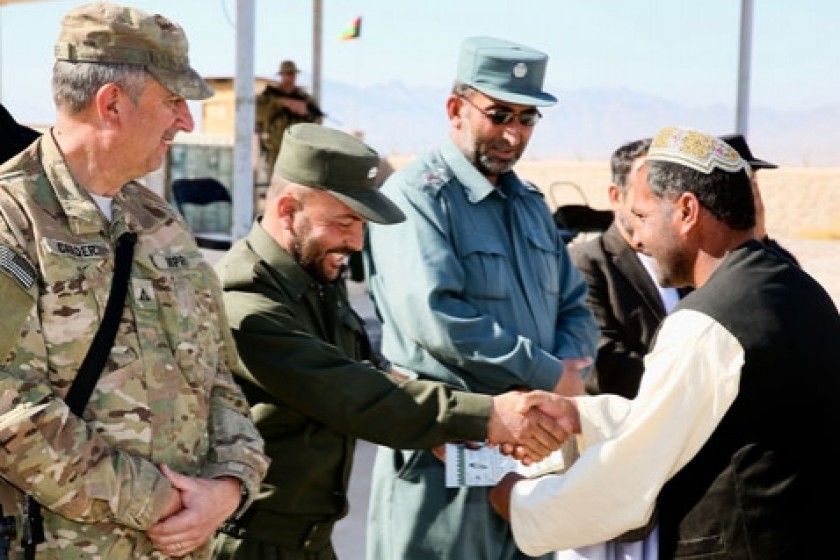
Is Corruption Holding Afghanistan Together?
Kevin Briskin
US Army Captain Brittany Ray spent a year in Afghanistan embedded with hundreds of Afghan Uniformed Police (AUP). After months of training, the AUP officers were shaping up into a competent paramilitary force.
But they weren’t getting the message on corruption.
The AUP forces would turn security checkpoints into toll booths, demanding cash from anyone who wanted to pass. They moonlighted as private security officers for civilians.
"Despite our best efforts, we could not convince the AUP that this was unethical," Ray said. "When we addressed and condemned it, they merely moved their operations out of view.”
Tom Coughran is a Green Beret major in the US Army and a veteran of multiple deployments to Afghanistan. He has mentored and molded the Afghan army's commandos, and he has observed the training of thousands of young Afghans to become professional officers in the Afghan National Police, or ALP. Coughran has watched as provincial leaders treated the valuable ALP slots as bartering tokens to curry favor with tribal figures and warlords.
"These ALP jobs, they're like baseball cards," he says. "They're a form of currency, they trade them."
The extortion and haggling over security forces described by Ray and Coughran is typical of the everyday corruption that ailsAfghanistan. But that type of commonplace, low-level corruption is not the war-torn nation’s biggest problem.
Coughran explains, "Is it corrupt? Yes. Is it in the grey area? Yes. But is it really degrading to security and stability in Afghanistan? That depends on where it's happening, depends on the area, so there's an example of corruption that's not right by our standards but right by Afghan standards."
With 2014 and the planned drawdown of NATO forces fast approaching, decisions made in coming months will determine the legacy of America's longest war. Some voices are calling for an abrupt pullout while others are calling for the eradication of all corruption, but those on the ground realize that a healthy Afghanistan requires a different approach.
A Way of Life
After more than a decade of fighting, war-weary nations are edging towards a complete pullout from Afghanistan, raising the risk that all progress made by coalition forces will evaporate without a continued international presence.
Sending young men and women to fight in a remote country is becoming ever less appealing to countries with troops in Afghanistan, and public support for the war is slipping away in the United States and its allies. Progress in the developing nation is difficult to measure, while reports of misspent funds, difficulty in training Afghan forces, and rampant corruption are powerful reasons for the US Congress and European parliaments to end the war efforts.
Capt. Ray says that the Western concept of "corruption" does not apply in Afghanistan, where "most Afghans see it as 'survival.'"
Bribery in Afghanistan is often the cost of doing business. Local leaders say they are only able to conduct dealings by giving and taking on the side. Sometimes it's money, sometimes it's jobs, sometimes it's as specific as ammunition, but it's often necessary to grease the wheels to get anything done.
Coughran explains that "in many ways the corruption challenges the peace, but in many other ways the corruption is what's holding this country together." In fact, low-level corruption may benefit the country, he thinks. Local leaders skimming off the top contribute to a more stable Afghanistan, because "they're willing to put the thumbscrews down on the people and tamp down the violence in their areas to make sure that they continue to benefit from the corruption," says Coughran, who believes that tackling low-level corruption is a fool's errand.
Instead of trying to prosecute every police officer who demands a bribe, many analysts and people serving in Afghanistan say that it makes more sense to focus on uprooting the high-level, large-scale corruption that causes far more damage to the country.
In 2012, investigations revealed that the heads of Kabul Bank, the institution paying the salaries of the Afghan military and police, were lining their pockets with hundreds of millions of dollars they funneled to Dubai. The scandal infuriated donors around the world, not only because Kabul Bank was egregious in scale, but because aid money was leaving the country.
And yet not everyone agrees that the major focus should be on high-level corruption. US Maj. Gen. Rick Waddell, in charge of a transparency task force, told NPR that corruption should be tackled from bottom to top.
"We work with good Afghans at all levels of the government," the general said. "What we tell them is let's go after the ones that we can, you go after lower-hanging fruit to make a difference."
But Center for Strategic and International Studies in Washington defense analyst Anthony Cordesman counters, "The real problem with the low-hanging fruit is, why low hanging?"
Cordesman believes that the easy targets are either too insignificant to matter or are being hung out to dry by their opponents, and either way it's a waste of resources to investigate them.
 Videos
Videos Photos
Photos




Write a comment